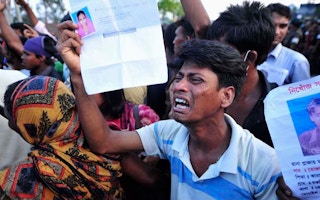Five global high street fashion brands have pulled out of a major garment industry event in Bangladesh due to concerns over a crackdown on unions demanding better pay in textile factories, campaigners said on Wednesday.
The retailers - H&M, Inditex, C&A, Next and Tchibo - who all source clothes from Bangladeshi factories, were expected to attend the Dhaka Apparel Summit which is due to be attended by Prime Minister Sheikh Hasina on February 25.
The Clean Clothes Campaign said the brands’ “unprecedented” decision to pull out of the event was a “major embarrassment” for the government and Bangladeshi Garment Manufacturers Export Association.
“It underscores growing international concern over the deterioration of labour rights in the Bangladesh garment industry,” the Netherlands-based group said in a statement.
C&A confirmed it had withdrawn from the summit amid concerns over the detention of trade unionists and advocates of workers rights following protests for better pay in December.
“C&A condemns any form of violence and injustice in connection with the labour protests,” it said in a statement.
“We strongly encourage the Government of Bangladesh to take immediate steps to ensure the protection of the workers’ rights, with special attention to the legitimate representatives of the workers who have been arrested.”
H&M also confirmed in a statement it was pulling out of the summit saying it believed attending it “would create confusion and send the wrong signals regarding our commitment to freedom of association” and that “the ongoing situation must be peacefully resolved before business as usual can be resumed”.
The other brands which together with C&A represent billions of dollars in revenue for Bangladesh were not immediately available for comment.
“
To maintain a peaceful environment, the law enforcement agency took measures, but it does not mean that the workers’ rights have been violated.
Mohammad Mujibul Haque, junior minister, ministry of labour and employment, Bangladesh
Bangladeshi government and apparel industry officials dismissed allegations that the labour rights of garment workers had deteriorated since workers protested in Dhaka’s Ashulia industrial area in December demanding higher pay.
Officials said the decision by the five western retailers not to attend the summit was unfortunate.
The fashion industry has come under increasing pressure to improve factory conditions and workers’ rights since the Rana Plaza garment factory complex collapsed in Bangladesh four years ago, killing more than 1,100 people.
Campaigners have criticised many retailers for failing to improve working conditions in their supply chains with long hours, low pay, poor safety standards and not being allowed to form trade unions common complaints from garment workers.
“Campaign of repression”
At least 1,500 workers were fired, trade union offices shut down and union leaders detained in a “campaign of repression” after the Ashulia protests, activists said.
But Mohammad Mujibul Haque, junior minister at the ministry of labour and employment, denied workers’ claims of violations, saying the protests were illegal and threatened law and order.
“To maintain a peaceful environment, the law enforcement agency took measures, but it does not mean that the workers’ rights have been violated,” Haque told the Thomson Reuters Foundation.
He said representatives from the government, industry and trade unions met on Wednesday to discuss the dispute.
Mohammad Siddiqur Rahman, president of the Bangladesh Garment Manufacturers and Exporters Association, dismissed the protests in December as “chaos and lawlessness created by a unruly section of workers”.
“Due to their illegal activities the genuine workers could not work for nine days,” Rahman said.
“In such a situation what could we do? We were forced to seek assistance from the government. They detained some people who created obstacles in production in the factories.”
The Ethical Trading Initiative (ETI), an alliance whose members include H&M, Inditex, C&A, Next and Tchibo, also said it was pulling out of the event as the only scheduled speaker from a labour union due to “an increasingly hard-line response” by authorities and industry.
“Unfortunately, the current intimidation of workers and their representatives is at odds with a progressive industry looking to secure the sustainable development of the sector,” said ETI Executive Director Peter McAllister.
This story was published with permission from Thomson Reuters Foundation, the charitable arm of Thomson Reuters, that covers humanitarian news, women’s rights, trafficking, property rights, climate change and resilience. Visit http://news.trust.org

















